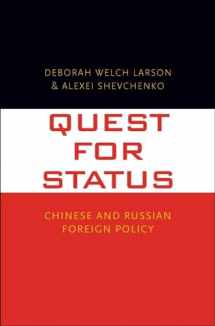
Quest for Status: Chinese and Russian Foreign Policy
ISBN-13:
9780300236040
ISBN-10:
0300236042
Author:
Deborah Welch Larson, Alexei Shevchenko
Publication date:
2019
Publisher:
Yale University Press
Format:
Hardcover
352 pages
Category:
China
,
Asian History
FREE US shipping
Book details
ISBN-13:
9780300236040
ISBN-10:
0300236042
Author:
Deborah Welch Larson, Alexei Shevchenko
Publication date:
2019
Publisher:
Yale University Press
Format:
Hardcover
352 pages
Category:
China
,
Asian History
Summary
Quest for Status: Chinese and Russian Foreign Policy (ISBN-13: 9780300236040 and ISBN-10: 0300236042), written by authors
Deborah Welch Larson, Alexei Shevchenko, was published by Yale University Press in 2019.
With an overall rating of 4.4 stars, it's a notable title among other
China
(Asian History) books. You can easily purchase or rent Quest for Status: Chinese and Russian Foreign Policy (Hardcover) from BooksRun,
along with many other new and used
China
books
and textbooks.
And, if you're looking to sell your copy, our current buyback offer is $0.39.
Description
A look at how the desire to improve international status affects Russia's and China's foreign policies
Deborah Welch Larson and Alexei Shevchenko argue that the desire for world status plays a key role in shaping the foreign policies of China and Russia. Applying social identity theory—the idea that individuals derive part of their identity from larger communities—to nations, they contend that China and Russia have used various modes of emulation, competition, and creativity to gain recognition from other countries and thus validate their respective identities. To make this argument, they analyze numerous cases, including Catherine the Great’s attempts to westernize Russia, China’s identity crises in the nineteenth century, and both countries’ responses to the end of the Cold War. The authors employ a multifaceted method of measuring status, factoring in influence and inclusion in multinational organizations, military clout, and cultural sway, among other considerations. Combined with historical precedent, this socio-psychological approach helps explain current trends in Russian and Chinese foreign policy.
Deborah Welch Larson and Alexei Shevchenko argue that the desire for world status plays a key role in shaping the foreign policies of China and Russia. Applying social identity theory—the idea that individuals derive part of their identity from larger communities—to nations, they contend that China and Russia have used various modes of emulation, competition, and creativity to gain recognition from other countries and thus validate their respective identities. To make this argument, they analyze numerous cases, including Catherine the Great’s attempts to westernize Russia, China’s identity crises in the nineteenth century, and both countries’ responses to the end of the Cold War. The authors employ a multifaceted method of measuring status, factoring in influence and inclusion in multinational organizations, military clout, and cultural sway, among other considerations. Combined with historical precedent, this socio-psychological approach helps explain current trends in Russian and Chinese foreign policy.


We would LOVE it if you could help us and other readers by reviewing the book
Book review

Congratulations! We have received your book review.
{user}
{createdAt}
by {truncated_author}


